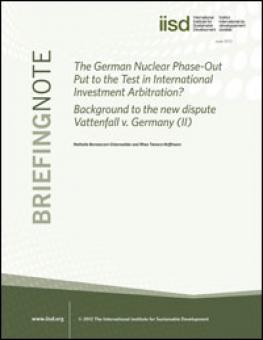
The German Nuclear Phase-Out Put to the Test in International Investment Arbitration? Background to the new dispute Vattenfall v. Germany (II)
The Swedish energy company Vattenfall has now followed through on its threat to bring an international arbitration claim against Germany in relation to that country's recent decision to phase out nuclear power. Damages claimed by Vattenfall could exceed €700 million.
The Swedish energy company Vattenfall has now followed through on its threat to bring an international arbitration claim against Germany in relation to that country's recent decision to phase out nuclear power.
On May 31, 2012, the dispute was registered at the International Centre for the Settlement of Investment Disputes (ICSID). According to earlier reporting, damages claimed by Vattenfall could exceed €700 million.German translation republished with permission PowerShift
Additional downloads
You might also be interested in
The State of Play in Vattenfall v. Germany II: Leaving the German public in the dark
Two years after Vattenfall brought Germany to international arbitration for a second time (Vattenfall II), the German public is still left out in the dark. This briefing note reviews the background to the case on Germany’s decision to phase out nuclear power and outlines its current state of play.
Background paper on Vattenfall v. Germany arbitration
This paper provides background on an investment dispute between the Swedish energy utility Vattenfall and the Government of Germany pursuant to the Energy Charter Treaty.
Why the Energy Charter Treaty Modernization Doesn't Deliver for Climate
The Energy Charter Conference adopted the "modernized" Energy Charter Treaty (ECT) on December 3, 2024. IISD's Lukas Schaugg explains what the modernization does, when it will enter into force, its tension with EU law, and why the reformed ECT can still hinder climate policies.
The Responsible Agricultural Investment Tool for Agribusiness and Case Studies
This report summarizes a collaboration to support agribusinesses in complying with principles of responsible investment in agriculture and food systems.